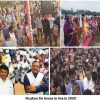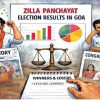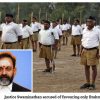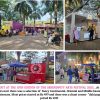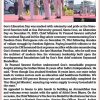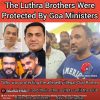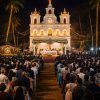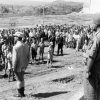Goa is abuzz with excitement as vintage bike and car owners, users, collectors and fans are decking […]
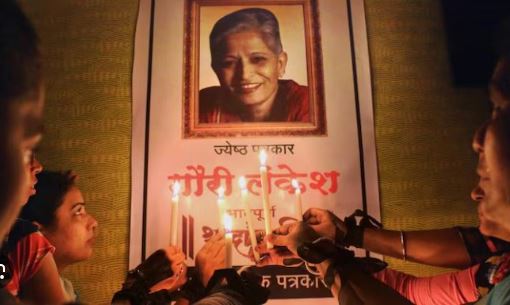
INVESTIGATE SANATAN SANSTHA OVER GAURI LANKESH AND OTHER MURDERS: ACTIVISTS TO GOVT!By Anisha Sheth, Vidya Sigamany
In the News, July 20- July 26 2024 July 19, 2024By Anisha Sheth, Vidya Sigamany
The family of Govind Pansare has called for an investigation into extremist Hindutva organisation Sanatan Sanstha’s alleged involvement in the murders of Pansare, Narendra Dabholkar, MM Kalburgi, and Gauri Lankesh.
Activists in Karnataka have renewed their demand for an investigation into Sanatan Sanstha, an extremist Hindutva organisation whose members have been accused in the murders of journalist-activist Gauri Lankesh, academic MM Kalburgi, CPI leader Govind Pansare, and rationalist Narendra Dabholkar.
The demand comes in the wake of a crucial petition filed by Pansare’s family with the Maharashtra Anti-Terrorism Squad (ATS) that is investigating his murder. The Bombay High Court is scheduled to hear the case again on Friday, July 12. In the petition submitted to Jayant Meena, Superintendent of Police, ATS, on June 27, the family sought an investigation into Sanatan Sanstha, which is based in Ponda, Goa.
The petition said that the police investigations showed that people linked to the Sanstha had carried out a series of four murders starting with that of Narendra Dabholkar in 2013, followed by those of Pansare, Kalburgi, and Gauri. They were also implicated in other crimes such as the Nalasopara arms seizure case of 2018.
Adding that statements made by the accused as well as other evidence listed in the chargesheets clearly showed that many of the accused in all four cases had ties with Sanatan Sanstha, the petition called for an investigation into the extremist Hindutva group.
The petition said that of the 12 people accused of murdering Govind Pansare in Kolhapur on February 16, 2015, seven have been named in the chargesheet filed in Gauri Lankesh’s murder, and four were also accused in both Gauri and Dabholkar’s murders. This includes Amol Kale, the prime accused in Gauri’s murder.
Kale, Vasudeo Suryawanshi, Amit Baddi, and Ganesh Miskin have been accused in both Gauri and Dabholkar’s murders, while Bharat Kurane, Amit Degwekar, and Sharad Kalaskar have been accused in Gauri’s murder. The petition also noted that many of the accused had been influenced by Sanstha literature, particularly the book Kshatra Dharma Sadhana, which is authored by the Sanstha’s founder, Jayant Athavale.
The four murders were linked also in terms of the weapons, the petition said. The weapon used in Dabholkar’s murder was also used to kill Pansare. Similarly, another weapon used in the murder of Pansare was also found in the killings of Kalburgi and Gauri.
Evidence from the statements of some of the accused suggest that they were full-time members of the Sanstha, but had travelled across several states, including Goa, Maharashtra, and Karnataka, to hold meetings and weapons training camps. When these accused had no other source of income, how could they have raised the money to organise these activities, the Pansare family’s petition asked.
Gauri’s sister Kavita Lankesh told TNM that these were worrying findings. “During the investigation into Gauri’s murder, they found a hit-list that included people like (the late writer) Girish Karnad. If people are being indoctrinated like this (by the Sanstha), then the organisation should be investigated. Both people who pulled the trigger and the masterminds must be held to account.”
Dr Vasu, a Bengaluru-based activist, said that Sanatan Sanstha was being treated with kid gloves. While maintaining that he was against banning any organisation or using the draconian Unlawful Activities Prevention Act (UAPA), not invoking UAPA suggested differential treatment when “there is clear evidence that there was a conspiracy to commit these crimes”.
Vasu said, “Members of the Sanatan Sanstha are accused in the chargesheets of many murders. The book Kshatra Dharma Sadhana (authored by Sanstha founder) says it is ok to kill people. But in other cases, the police have used UAPA even when they had a quarter of the evidence that they have about Sanatan Sanstha’s involvement.”
He said that the differential treatment was also evident in the state government’s refusal to initiate proceedings to ban the Sanstha.
The Karnataka government had in 2011 urged the Union government to ban the Sanstha, but the proposal was rejected. The governments of Goa and Maharashtra too had made similar demands.
In 2018, Kavitha Lankesh and activists demanding justice for Gauri had met then Home Minister Dr G Parameshwara seeking a ban on the Sanstha, but he had then said that it would be done only if there was evidence.
Vasu said that the Congress government in the state must now act to prove its stated positions. “The Congress must prove its commitment to the Constitution. They have been accusing the BJP of not following the law. Now that they are in power, they must show that they will uphold the law and investigate organisations like the Sanstha.”
Bengaluru-based activist Shivasundar told TNM that investigating Sanatan Sanstha was important not only because the organisational collusion of the Sanstha could be exposed, but also because it would force a public discussion on the activities of such extremist groups and their ideologies.
He said that investigations of past crimes across the country, such as the Samjhauta Express bombing (2007), the Malegaon blasts (2006 and 2008), the Mecca Masjid blast, and others had exposed the fact that many of these organisations were “internally connected and financed by similar sources” even though there were no official membership records or resolutions of decisions.
Because there was an investigation, the public learned that Aseemanand and Sadhvi Pragya had allegedly acted on the orders of some of the highest office-bearers of the Rashtriya Swayamsevak Sangh (RSS) such as Indresh Kumar, Shivasundar said.
“The political fallout was that Hindutva terrorism was discussed in the public between 2010-12, and they hardly had any defence for that. This was a political setback for the RSS back then.”
He also pointed to the letter written by former Gujarat DIG Vanzara in 2013, which essentially said that the Gujarat government headed by Narendra Modi had reaped political benefits from the extra-judicial killings carried out by the police, but did not protect the police officers. Vanzara and other police personnel were investigated for multiple extra-judicial killings by various agencies including the CBI.
“One of the reasons for continuation (of the relationship) between Modi and the RSS was that if the UPA government came back for a third term in 2014, many of them were deeply afraid that they would be exposed, and Vanzara had threatened to do exactly that,” Shivasundar said.
He said that investigating the role of Sanatan Sanstha in these murders and other crimes will have a moral impact on society, just like it did when the RSS and Hindutva terrorism were discussed in the same breath a decade ago, and when MK Gandhi was murdered in 1948. “Because the RSS was investigated in Gandhi’s murder, it suffered a moral setback for many decades.”
But Shivasundar said there was a crucial difference between the time of Gandhi’s murder and now. “Gandhi’s murder was a one-off thing. What is happening now are crimes of organised hatred. If there is a focused investigation monitored by the Supreme Court, Sanatan Sanstha would be discussed in public and it will harm them morally. That is the larger benefit. Even if you can’t punish them (Sanatan Sanstha and other organisations) legally, the law can be used to raise a political question and push such organisations back ideologically.”
Pansare’s family has said that the Central Bureau of Investigation and the investigating agencies of Goa, Maharashtra, and Karnataka were aware of the role the Sanstha and its sadhaks played in the four murders and other crimes. “However, for reasons best known to the investigating agencies, this angle has not been examined. Therefore, it is necessary to investigate the role of Sanatan Sanstha and the people governing Sanatan Sanstha, as an organised terrorist network of criminals, acting under the guidance and directions of Mr. Jayant Athavale and Mr. Virendra Marathe.”
This reporting is made possible with support from Report for the World, an initiative of The GroundTruth Project.
Courtesy: News Minutes


